Annual report 2022



"As I'm young, freedom is very important to me, so temporary work is perfect!"




"As I'm young, freedom is very important to me, so temporary work is perfect!"

The past few years have not been kind to us, and 2022 was once again an intense, challenging period. Geopolitical instability and its human and economic impact will continue to leave their mark indefinitely. Demographic aging plus labor and skills shortages are also putting the Swiss economy under strain.
Our sector supports flexworkers and hiring companies on a daily basis, so that they can assume their responsibilities even in these fraught times. The labor market is not likely to ease in the near future, in fact quite the opposite: numerous studies anticipate up to 500,000 job vacancies by 2030. It is clear that our sector bears particular responsibility for a healthy, attractive and thus innovative economy. Without the required workforce, Switzerland’s prosperity is at risk.
swissstaffing’s strategic goals are designed to enable our sector to face the aforementioned challenges. I would like to touch on a couple of groundbreaking examples. First of all, we are rolling out our self-learning platform for HR consultants. Secondly, we have more people than ever taking the “HR Expert with Specialization C” qualification. Thirdly, we are launching our occupational health and safety industry solution for staff leasing.
And last but not least, I would like to mention the expansion of our political network in the federal parliament, as well as the increase in our public relations work. Both of these are hugely important for our sector. It is about ensuring a free market economy whilst also keeping pace with changes to the working world. This requires targeted communications and a lot of intensive convincing.
Our latest white paper persuasively demonstrates how strong the need for flexible working is, and how well temporary workers are positioned compared with other flexworkers. In short: ultra-flexibility paired with social responsibility is the key to success. I strongly recommend reading the white paper.
I would like to take this opportunity to thank our members, our office and our board of directors. Without their tireless joint efforts and professionalism, we would not be able to meet the expectations of both flexworkers and the economy.
Leif Agnéus President of swissstaffing
The board of directors is swissstaffing’s governing body and includes staffing service providers of all sizes from various regions of Switzerland. This ensures that the interests of the entire sector are represented. Jana Jutzi was recently elected to the board and Marcel Keller recently joined the board and management committee. The board has ten members.


We were shocked and devastated to hear of the death of our hugely valued long-term board member Taco de Vries. He had represented Randstad on the swissstaffing board since 2016, during which period he was actively involved in shaping our association’s direction. We will very much miss his calm manner and his consistently objective and constructive contributions to sometimes heated debates among the board. We will also fondly remember his humor and positive attitude. We will honor his memory.









swissstaffing welcomed 39 new members in 2022. 23 companies left the association. More than three quarters of the departures were due to bankruptcy or to ceasing staff leasing activities. swissstaffing had a total of 468 members at the end of 2022, representing a growth rate of nearly 4 percent.
SQS, swissstaffing’s certification partner, performed 91 audits of new and existing members. The majority of the audits were performed onsite in 2022. The swissstaffing quality label is a nationally recognized seal of approval developed specifically for the sector, reviewing the professionalism of staff leasing services. swissstaffing would like to congratulate all of its members that have successfully completed the audit.
The 54th Annual General Meeting was held at Kursaal Bern on June 23, 2022. It took place in person without any coronavirus restrictions. There were 100 attendees with 297 votes, making the Annual General Meeting quorate.
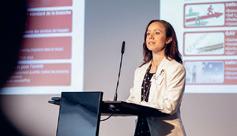
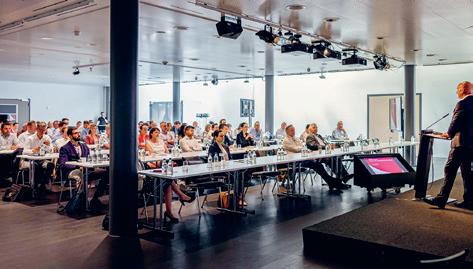


The two new candidates for the Board of Directors introduced themselves in person. Jana Jutzi is the CEO of Careerplus AG, and Marcel Keller is the CEO of The Adecco Group Switzerland. Both were unanimously elected by the Annual General Meeting: Jana Jutzi as a board member and Marcel Keller as a member of the board and management committee.

A new negotiating delegation was elected for the ongoing negotiations regarding the CBA on Staff Leasing. The new head of the delegation is Andreas Eichenberger, CEO of Induserv Industrial Services Ltd. The proposed amendment to the statutes regarding expulsion from the association in the event of non-payment of social security contributions was unanimously adopted by the Annual General Meeting.

Finally, Leif Agnéus congratulated the 21 people who were awarded the distinction of “Certified Staffing Professional swissstaffing”. The subsequent lunch was followed by the flexwork event bearing the title “The Future of Flexwork –How to Succeed!”.


61 CEOs and decision makers attended the CEO meeting in Zurich and Lausanne. President Leif Agnéus and Director Myra Fischer-Rosinger offered an in-depth insight into the association’s lobbying strategy and upcoming strategic projects. The 2024 CBA on Staff Leasing and the forthcoming negotiations were also on the agenda. QAS, the new occupational health and safety industry solution, was about to be launched, and attendees were given vital information about this project. The opportunity to meet and discuss was actively used, both during the meeting itself and at the networking drinks afterwards.
As a new development, one of the two regional meetings in March and November was held in-person and the other online. These were once again presented in three languages – German, French and Italian.
In March, swissstaffing welcomed 246 attendees from seven Swiss cities. Topics covered included the reimbursement changes in the CBA on Staff Leasing, new developments in swissstaffing’s pension and compensation fund, and the new Swiss Staffingindex. The high point of the regional meeting was a guest presentation on monitoring of the CBA on Staff Leasing given by Roman D. Cornu, president of regional joint committee for staff leasing for German-speaking Switzerland.
The regional meeting in November was held as a live stream via Zoom. Nearly 400 people attended. swissstaffing presented two new services: the brand-new, certified industry solution for occupational health and safety in staff leasing and the self-learning platform for HR consultants with a pilot project launching in April 2023. The swissstaffing Legal department representative explained the changes for 2023: new minimum wages, the amended Annex 1, and the removal of exempted sectors. He also answered numerous questions.

"Temporary work offers lots of freedom, independence and autonomy, which is fantastic as an employee."
2022 was a very dynamic year. Coronavirus boosted flexwork. At the same time, the pandemic and the war in Ukraine stirred up the global economy. Demographic aging is becoming increasingly noticeable, with a significant labor shortage. To support staffing service providers in this dynamic environment, the 32-strong swissstaffing team has been continually further developing the association’s services and designing new ones.
Political recognition of the staff leasing sector is key to ensuring positive changes to framework conditions. The political advisory board met twice to discuss current topics and outline potential political action. This related to restrictions on temporary work in various cantons, BVG reform, temporary recruitment for private households, night and Sunday work for HR consultants, and the requirement for temporary worker contracts to be concluded in writing. At the same time, swissstaffing has established new political contacts, particularly in Italian-speaking Switzerland.
The industry statistics and white paper form the basis for political activities. swissstaffing has developed the Swiss Staffingindex into a comprehensive industry barometer and, with its new white paper “Comparing Flexible Working Models”, it is also once again a pioneer for the staffing industry.
In a world of increasing flexwork, it is important that this stands on a solid foundation of quality. With this in mind, swissstaffing has launched QAS, the occupational health and safety industry solution for staff leasing, and developed a self-learning platform for HR consultants, which will be introduced in 2023.
The CBA on Staff Leasing is still a vital quality tool, which swissstaffing has been further developing with the targeted amendment of Annex 1. The CBA is now cross-sector, with increased legal security for the temporary workers and companies subject to it.
The swissstaffing pension fund and temptraining training fund are also being modernized: the swissstaffing 2 nd Pillar Foundation introduced a new retirement plan for highly qualified temporary workers – a population that is continuing to grow and has specific retirement requirements. temptraining is working to redesign the application process from the ground up, to give temporary workers and staff leasing companies greater flexibility in planning their further training. The new process and its new web portal are going live in 2023.
All of this has only been possible thanks to the commitment shown by every office team member on a daily basis and to the swissstaffing members’ trust in and loyalty to the association. Thank you very much!
Myra Fischer-Rosinger Director of

Despite huge volatility on the financial markets, the swissstaffing 2 nd Pillar Foundation once again enjoyed a very good investment result of +9.4 percent. This result and the low costs of fewer than 300 Swiss francs per beneficiary also enabled a generous interest rate of 3 percent on retirement assets in 2022.
89 percent of the nearly 12,000 inbound calls during 2022 were picked up directly. The Foundation handled a total of more than 24,000 inquiries and over 87,000 business cases. From April 1, 2022, the association’s in-house pension fund was able to announce a reduction in risk premiums to 1.75 percent, the introduction of supplementary death benefits for temporary contracts, and the introduction of new retirement plans for highly qualified temporary workers. The latest conditions for permanent and temporary staff are continually published at swissstaffing-bvg.ch.
714 contracts were processed for the KTG industry solution (previous year: 646). The total subsidized wage bill was 4.569 billion Swiss francs (+18 percent). Of the total wage bill relevant to the CBA on Staff Leasing, 80.6 percent was insured by the KTG industry solution (previous year: 77.4 percent). The premium subsidies paid out increased by 18 percent to 18.274 million Swiss francs.
Premium income (taking into account the subsidy amount of 0.4 percent) amounted to 91.984 million Swiss francs. Total payments by insurers amounted to 82.014 million Swiss francs, and the benefits ratio for risk premiums collected was 93 percent (previous year: 105 percent). The average premium rate increased to 2.85 percent (previous year: 2.51 percent).
The swisstempcomp OASI compensation and the swisstempfamily family compensation fund, run by consimo, introduced their new ERP system AKIS and their new client portal “connect” during the second half of the year. It is designed to increase efficiency for clients and reduce their administrative burden. The switchover caused a delay in handling client inquiries and in reviewing applications for family allowances. Despite a special effort on consimo’s part, they were unfortunately not able to eliminate the case handling backlog by the end of 2022. The situation should improve by halfway through 2023.
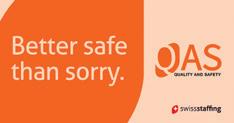

The project to introduce the QAS occupational health and safety industry solution, launched in 2021, was successfully completed with certification being granted by the Federal Coordination Commission for Occupational Safety (FCOS), the federal government’s permanent extra-parliamentary commission for occupational heath and safety. The association is proud to be able to offer its members and other interested parties this industry solution tailored specifically to staff leasing. With the industry solution, staff leasing providers can improve their employees’ security whilst also ensuring that they are ideally prepared for mandatory checks by Suva. By using QAS, affiliated companies will comply with the requirements set out in FCOS guideline no. 6508.
With the QAS industry solution, swissstaffing is offering a practice-oriented, legally compliant “toolbox” in line with the ASA concept, including consulting occupational doctors and other occupational safety specialists. QAS comprises multiple components: a handbook with practical templates, checklists and implementation aids, “safely” (a handy digital system), advice from experts, safety training, exchanging experiences annually, and much more.
Collaboration with Suva
swissstaffing was once again able to count on the support and expertise of Suva in 2022. Suva provided swissstaffing with significant consulting in the development of the QAS industry solution. They also provided active, engaging training on occupational health and safety and care management at the swissstaffing premises.
swissstaffing and Suva would like to continue to expand their excellent collaborations in 2023. The primary objective is to sustainably and demonstrably reduce accidents and absences in the staffing industry.

Labor shortage, omicron, supply bottlenecks and inflation – the annual figures from staffing service providers illustrate the roller coaster ride that was 2022. Staffing service providers concluded 2022 with an increase of 7.2 percent year-on-year in the temporary staffing sector. The number of permanent position placements even rose by 9.3 percent. According to the Swiss Staffingindex, there were huge variations in growth rates over the course of the year. These were shaped by the hot topics of 2022: the labor shortage, omicron, supply bottlenecks and inflation. The temporary staffing sector saw a boom in the first quarter of 17.6 percent due to omicron, and the increasing lack of skilled workers and employees prompted an increase in business development of 3.4 percent in the fourth quarter. Even more astonishingly, there was strong growth of 10 percent in the temporary staffing sector and 20.1 percent in the permanent staffing sector in December.

The extremes of growth experienced by staffing service providers in 2022 were symptomatically reflected by the situation in healthcare. Vaccination centers, staffing shortages in hospitals, and work absences as a result of coronavirus brought staffing service providers onto the scene at the beginning of the year. They provided the economy with the short-term workers it needed and helped keep Switzerland’s economic engine running. The result was a comfortable increase in the temporary staffing sector.
Ariane M. Baer Head of Economics and Politics
At the end of the year, healthcare once again illustrated the greatest challenge facing the economy and staffing service providers – hospitals needed nurses to keep things running, but they had a shortage of staff. This is where staffing service providers came in: with their flexible working models, they helped to fully tap the skilled labor potential and keep nurses in the job.
However, the labor shortage also limited the growth of staffing service providers and caused a significant slowdown.
The trend with permanent positions contrasted with developments in the temporary staffing sector. Strong growth of around 9 percent was recorded in the first and second quarters, followed by a weak third quarter due to the explosion in fuel prices and increasing uncertainty. The lasting shortage of skilled and manual labor prompted a real boom in the fourth quarter, with business up 21.8 percent compared with the previous year. The temporary staffing sector also enjoyed a pleasing end to the year with 6 percent more working hours rendered. The warm weather kept construction activities going, and without concerns about coronavirus, retail and gastronomy enjoyed a boom.
Please note: This data was estimated based on the Swiss Staffingindex. Sources: SSUV, SECO, BFS

"Temporary work is the easiest way to pick up part-time jobs which is important for me as a student."
In 2022, swissstaffing published the white paper “Temporary workers are in the best position: comparing flexible working models”. The study provides information about the frequency of flexible working models in Switzerland and offers a portrait of six flexworkers. A legal analysis demonstrates the challenges in social security and how temporary work has solved them.
According to SAKE data from the Federal Statistical Office, 26 percent of workers – or 1.3 million people – were flexworkers in 2020. A comparison was made of six flexible working models outside of a full-time position with a single employer.
Flexworkers not in temporary work are mostly women, aged over 40, Swiss nationals, highly educated and active in the service sector. Temporary workers have a different profile: they are overwhelmingly male, aged under 40, and work in construction, industry, logistics and technology.
Of all of the flexible working models analyzed, people in temporary work have the greatest social security. Temporary workers are collectively insured for sick pay thanks to the CBA on Staff Leasing. In terms of pension provision, the entry threshold for pension funds is not an issue. Temporary workers also have access to further training courses thanks to the temptraining equal-opportunities training fund.
Flexworkers contribute significantly to value creation and reduce specialist and labor shortages. On the one hand, taking this path means that Switzerland succeeds in attracting valuable specialists for the economy and ensuring Switzerland’s position as a business location with the flexibility factor. On the other hand, gaps in social security and an insecure employment situation represent risks for flexworkers. Under the umbrella of temporary work, people using a flexible working model can also close gaps in their social security whilst also retaining their flexibility.
"Temporary workers are in the best position: comparing flexible working models"
In 2022, the Communication team was heavily involved in activities including the swissstaffing.ch online presence. The aims were to improve its clarity and user navigation, establish a fresher look, and create a new visual world. Feedback has been entirely positive and has shown that the work was a success. As well as the association’s website, the Communication team also manages the swissstaffing pension fund, the temptraining training fund and the CBA on Staff Leasing.
With 40 trilingual blog posts, 130 social media posts with more than 200,000 impressions, and the monthly newsletter, the team is playing a big part in promoting the image of the sector and the association. swissstaffing also kept its members up to date with a total of 30 CEO newsletters on politically and legally relevant topics. A new special newsletter called “Update swissstaffing” is specifically aimed at swissstaffing’s political and economic partners.
The flexwork event on the topic of “The Future of Flexwork – How to Succeed”, organized by the Communication team, took place with in-person attendees for the first time in June 2022 (see page 20). At the Kursaal Bern, swissstaffing and various other participants showcased solutions for the flexible working world of the future. swissstaffing also covered this topic during panel discussions at the HR Festival in Zurich and Salon RH in Geneva.
swissstaffing has featured in the media in relation to numerous topics. The Communication team was in touch with media representatives more than 70 times and assisted numerous articles and interviews, including for SRF 10vor10, Radio SRF, SonntagsBlick, Berner Zeitung, HZ Insurance, Corriere del Ticino, Le Temps, 24heures, RTS Radio and AWP Soziale Sicherheit. swissstaffing achieved a notable media presence with more than 492 mentions.


It offered information about current topics, industry figures and new studies via a range of press releases. The distribution channel presseportal.ch recorded the swissstaffing newsroom being accessed more than 55,800 times. The trade magazine HR Today published numerous specialist articles penned by the association. Once again in 2022, the Communication team worked with the Economics & Politics department to produce and publish a new white paper. It compares various different working models, reaching the conclusion that “Temporary workers are in the best position” (see page 17).
As a hub of communications, the team also supports other internal departments with specialist expertise and measures to advertise a wide range of services. Advertising campaigns for the swissstaffing pension fund and the temptraining training fund were also launched in 2022.



The HR Festival europe in Zurich is an event for HR specialists and is the largest HR trade fair in Switzerland. swissstaffing was at the HR Festival europe 2022 for the panel discussion “HR Change: Why Flexwork is the Future”. Notable panel guests from business, staff leasing services and research discussed flexible working models, the development of the labor market, and the challenges that flexwork poses for HR.
“Salon RH” is an HR trade fair for French-speaking Switzerland, held in Geneva in 2022. swissstaffing was an official cooperation partner and took part in the panel discussion “HR Change: Why Flexwork is the Future”. The panel discussion participants examined the topic from various perspectives and discussed the future aspects of flexwork for key players such as companies, jobseekers, governments and society.




In 2022, the Communication team created a quadrilingual campaign for the swissstaffing pension fund, bearing the core message “even better, even cheaper”. The aim was to make people aware of the updated, even more attractive services offered by the pension fund and of the new “Temp Premium” pension plan for highly qualified individuals. The core of the campaign was image and text banners with pithy messages, deployed across a variety of channels.

On June 23, 2022 Leif Agnéus welcomed around 170 guests to the third ever Flexwork Event, bearing the slogan “The Future of Flexwork – How to Succeed”. The event was held at Kursaal Bern in German with simultaneous interpretation into French and Italian.







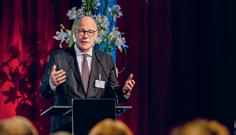
The event was moderated by Andi Lüscher, Business Editor of SRF. Dr. Boris Zürcher, Head of the Labor Directorate at SECO, gave a keynote speech. Myra Fischer-Rosinger, Director of swissstaffing, presented the white paper “Comparing flexible working models”. Andi Lüscher interviewed Nicole Hostettler, President of the Association of Swiss Labor Market Authorities VSAA and Head of the Office for Economy and Labor for the Canton of Basel AWA.
The subsequent panel discussion covered topics ranging from working from home in a globalized world to the role played by the staff leasing sector in reducing the skills shortage. On the stage: Melanie Mettler, National Councillor and Vice-President of GLP Switzerland, Marc Flückiger, CEO and Co-Owner of Work Selection AG, Prof. Dr. Isabelle Wildhaber, Professor of Private and Business Law at HSG and Director of HSG’s Institute for Work and Employment Research, Patrizia Laeri, CEO and Co-Founder elleXX, and Stefan Studer, CEO of Angestellte Schweiz.
Once again, the event confirmed that flexwork is more than just a trend, and will also be a key topic for the working world in the coming years.
With the annual Flexwork Event, swissstaffing is seeking to promote discussions about flexible working, position temporary work as a pioneering element for shaping flexwork, present temporary work as a fair working model, and showcase solutions for the flexible working world of the future from various perspectives.
The Flexwork Event 2022 can be revisited as a short film of highlights or in its entirety at swissstaffing.ch/flexwork-event.










The Operations & Member Services team, the central hub of swissstaffing, was working flat out in 2022. They fielded around 4,500 calls for swissstaffing and more than 38,000 calls for temptraining, as well as organizing and running numerous onsite meetings. Further improvements were made to the IT infrastructure for internal services, with a new server, new network cabling and numerous large system updates.
QR billing was introduced for accounting. The association invoiced for nearly 900 services – training, event attendance, legal advice, ARGUS subscriptions or leaflet mailing – during 2022. This was around 200 more invoices than in the previous year.
The swissstaffing membership attracted great interest. The Operations & Members Services team organized numerous consultations and member visits. swissstaffing President Leif Agnéus once again visited numerous current and prospective members during 2022. A new digital application form was added to the swissstaffing website in August 2022.
The majority of swissstaffing events in 2022 were held in person. swissstaffing was able to personally welcome more than 246 visitors. At the request of numerous members, the regional meeting in November was held online, with a total of 396 attendees. The two regional meetings will now alternate between being held in person and online.


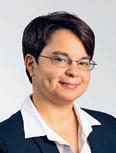




There was high demand for training courses for HR consultants. These were offered both online (188 participants) and in person (199 participants). The “Law for Beginners” course was once again very popular. It was run in German and French, with a total of 185 participants. Numerous members also booked an internal company course on labor law. 101 participants took advantage of the occupational safety training on offer. The new absence management training course was run twice.
QAS, the industry solution for occupational health and safety in staff leasing, was launched in October 2022. After nearly two years of preparation, it was certified on schedule by FCOS on October 26. swissstaffing is proud that the sector has its own certified industry solution and is working to ensure sustainable occupational health and safety. By the end of 2022, 46 companies and corporate groups had joined the industry solution.
The Legal department is the center of excellence for the staffing industry as regards questions relating to labor, employment, social security, alien and general contract law. The Legal department advised association members and non-members on 1661 cases in 2022. It was also tasked with implementing the CBA on Staff Leasing by the secretariat of the appeals committee of the Association for Bipartite Enforcement, Continuing Training and the Social Fund for Staff Leasing.
The Legal department once again headed the “Temporary recruitment for private households” specialist group. This in particular analyzed the labor law consequences of the federal court decision of December 22, 2021 (BGE 2C_470/2020) for temporary recruitment in private households. It also held discussions with social partners regarding regulating the “live-in” model for temporary recruitment.
In 2022, the Legal department also focused its attention on the restrictions on temporary working. swissstaffing lodged complaints with the cantonal courts in Geneva and Vaud regarding legislative revisions relating to public procurement.
As part of the expansion of Annex 1, the Legal department team worked on the inclusion of a CBA without a declaration of general applicability, and monitored the associated process for implementation from January 1, 2023. As regards working from home across borders, the Legal department monitored developments in the legal situation and kept members informed about the ramifications.

The Legal department ran its “Law for Beginners” course both virtually and in person in Zurich and Lausanne in 2022, to inform members about the legal aspects of the sector.


As part of the white paper “Comparing flexible working models”, the Legal department made legal assessments of existing flexible working models, compared the social security position for different employment situations and, based on this, determined that flexworkers using staff leasing have the greatest social security.




"As a temporary worker, I make my own work-life balance."
2022 was a very successful year for the HR Expert with Specialization C qualification. A total of 66 people completed the examination in the fall of 2022. The pass rate was 76 percent and the average grade was 4.33. The participants who attended the training portion of the HR Expert with Specialization C qualification received prior training from swissstaffing’s collaborative partners. This included the three highest scorers of the year, with two grades of 5.3 and one of 5.1.
swissstaffing would like to congratulate all graduates and wish them every success in their further careers.
As part of the process of developing the industry standard, swissstaffing has been developing a self-learning platform. The project managers worked intensively on this in 2022, together with external partners.
The first phase should see the platform provide new employees in the staff leasing sector with opportunities for further training via self study. A virtual world will offer 26 topics with a total of 15 dynamic, interactive hours of training. The self-learning platform is scheduled to be launched in the fall of 2023.
Sabrina Fellmann Project Manager Education

swissstaffing is further enhancing the quality of the sector with various specialist courses for HR consultants. These regular courses cover topics such as labor law, interview techniques and acquiring customers. The “Social Media Recruiting” course was created by the Personnel Development team for 2022. It will be available in revised form for 2023.
In 2022, temptraining approved more than 14,000 further training applications amounting to around 17.9 million Swiss francs. This put the total value of the approved applications at around 0.9 million Swiss francs higher than the previous year. More than 98 percent of all applications were submitted via the online portal.









The general assembly of the Association for Bipartite Enforcement, Continuing Training and the Social Fund for Staff Leasing (PVP) has agreed a regulatory change from January 1, 2022. Occupational safety courses must teach practical applications via in-person classes – fully online courses will no longer be accepted. Temporary workers must also be able to submit proof of at least 88 hours worked in order for approved occupational safety courses to be funded.
Other regulatory changes to the further training fund are planned from September 1, 2023, including more flexible timings for application submissions,



a continuous budget system based on hours worked, new lump-sum compensation for loss of earnings and expenses, and a flat-rate payment for occupational safety courses not debited to the personal account. The regulatory changes were approved by the general assembly in December 2022.
temptraining is planning to launch a new web portal in 2023. This seeks to make applications easier to submit, automate processes, and provide applicants with new functions, such as searching for approved courses. The requirements for the new system were formulated in 2022. The next steps involve communicating and implementing the regulatory changes.
In 2022, temptraining launched a pilot project for an app to recommend further training opportunities to temporary workers based on their skills and expertise. The pilot project ends in May 2023, after which it will be evaluated before determining the next steps.
Shaping the regulatory framework for the staff leasing services sector is one of swissstaffing’s core tasks. The association therefore invests significant amounts in publicizing the sector and cultivating contacts in politics and administration at federal and cantonal level. swissstaffing has two objectives in this:
• Administrators and politicians at national and cantonal level should be made aware of swissstaffing’s positions and arguments and take them into account in their decision-making processes.
• The staff leasing services sector also should not be discriminated against by regulatory factors and should retain flexible conditions.
Various cantonal parliaments in French-speaking and Italian-speaking Switzerland have received proposals for restricting temporary work in public procurement. swissstaffing is convinced that a regulation such as this would infringe economic freedom. The association is therefore fighting these proposals by political and legal means. Court decisions are pending in the cantons of Ticino, Geneva and Vaud. The proposals are still stuck in parliamentary process in the cantons of Valais, Jura and Neuchâtel.
One particularly problematic element of these proposals is the fact that decision makers are often not sufficiently aware that restricting temporary work prevents solutions being found for the labor market of the future and instead promotes questionable working conditions. Flexwork is a necessity and an imperative for both companies and employees. Temporary work is tightly regulated by the Swiss Federal Law on Employment Recruitment and the CBA on Staff Leasing, and temporary workers have comprehensive social security. The alternative to temporary work (if this is only permitted to a limited extent) would not be permanent positions, but rather other, less well-regulated forms of flexwork, false self-employment or even illegal employment.
Given demographic aging and the flexibilization of the labor market, reform of the BVG is urgently required, but is a hard nut to crack from a political perspective. For swissstaffing and staffing service providers, the questions of the coordination deduction and the entry threshold are particularly relevant. Unfortunately, all of the amendments to the entry threshold and coordination deduction currently up for discussion in parliament threaten the tried-andtested pension model for the staffing service sector. This provides temporary workers with access to disability and old-age insurance from their first working hour under the 2 nd Pillar.
swissstaffing is advocating for an exemption to prevent the paradoxical outcome of a reform destroying good practice for exactly the flexible workers whose situation it seeks to improve.
“New or further developed innovative solutions are required that combine flexibility with social security. The elements of the Swiss Federal Law on Employment Recruitment relating to temporary work could play a key role, but selective modernization of the Federal Law on Employment Recruitment is needed to enable new working models and ensure that they are more secure. This could be achieved by removing the requirement for contracts to be concluded in writing (introduction of a digital signature) and by a more flexible arrangement for working hours. This would be a better approach than making flexwork impossible and forcing all those affected back into illegal employment or false selfemployment without social security. Flexibility and social security should not be mutually exclusive.”
Recruiting temporary care workers for private households is a specific segment of the staff leasing sector. Its business model has been put under threat by the federal court decision of December 22, 2021 (BGE 2C_470/2020). The federal court decided that working relationships like this are subject to Swiss labor law (ArG), whilst care staff employed directly by the household are not subject to the ArG. In doing so, Switzerland’s decision-makers have once again failed to recognize the huge benefits of temporary work and instead encouraged alternative business models that are much less well regulated and controlled than temporary work. It is not just the ArG that does not apply to direct employment within a household – minimum wage and working time provisions are not applicable, nor are the solutions for sick pay or professional pensions covered by the CBA on Staff Leasing.
swissstaffing is advocating an exemption in labor law regulations to enable home-based care via staff leasing to remain possible and financially feasible under labor law. The CBA on Staff Leasing also needs to be supplemented with a specific Annex for “live-in” models. Given demographic aging and increasing health and care costs, privately funded home-based care is also key from a health policy perspective. It is vital that the associated working relationships are regulated in a fair manner, which the staff leasing model ensures.
On March 9, 2022, the Council of States missed a huge opportunity to make Switzerland more agile and digital. By voting down the Schneeberger motion (19.3565), there are no rapid improvements in sight to introduce a widely accepted digital solution to handwritten signatures. As temporary work contracts (unlike other work contracts) must be made in writing, this hugely impacts the staff leasing sector. Fortunately, the debate – during which staff leasing services were explicitly referenced multiple times – showed that this is being seen as a real economic problem and that the administration will remain under pressure to reduce the level of protection in certain areas. swissstaffing will keep pushing on this topic so that staff leasing can be conducted entirely digitally in the future.
Professor of Private Law and Business Law specializing in Labor Law at the University of St. Gallen and Executive Director of the Institute for Work and Employment Research at the University of St. Gallen

The CBA on Staff Leasing is a key tool that supports the flexibility of temporary work via regulations and comprehensive social security. Further development of the CBA on Staff Leasing is a key concern for swissstaffing, especially given the dynamic labor market. The minimum wages under the CBA on Staff Leasing thus apply to all sectors from January 2023. The previous exceptions for the chemical/pharmaceutical, graphics, machine, watch, food and beverage industries and public transport services have been removed. In addition, Annex 1 of the CBA on Staff Leasing is being supplemented in selective areas with CBAs that are not universally applicable, the wage and working time provisions of which will now also apply to temporary workers. This development will provide significantly more protection for temporary workers and increase legal certainty for all involved.

"Different deployments mean I can gain lots of professional experience and develop further."
Legal Notice
Publisher
©2022 swissstaffing
Association of Swiss Recruitment Agencies

Stettbachstrasse 10, CH-8600 Dübendorf, +41 (0)44 388 95 40 info@swissstaffing.ch, swissstaffing.ch
Production Management
Celeste Bella, , Project Manager Communication
Staff
Ariane M. Baer, Head of Economics and Politics
Julia Bryner, Head of Operations & Member Services
Maria Cantagallo, Project Manager Operations & Member Services
Alexander Dorizzi, Ad interim Head of Operations & Member Services
Boris Eicher, Head of Legal Department
Myra Fischer-Rosinger, Director
Dr. Marius Osterfeld, Economist
Irène Righetti, Head of Personnel Development
Claudio Trenna, Head of temptraining
Blandina Werren, Head of Communication
Proofreading
Antonia Janina Fischer, fischertext, fischertext.ch
Translations
ARGUS Sprachmanufaktur, sprachmanufaktur.ch
Design
Andrea Gmünder, feinform grafik, feinform.ch
Printing
Typotron AG, typotron.ch
Image Credits
Getty Images Shutterstock
Photos of Flexwork Event, Annual General Meeting and swissstaffing employees (as at 12/31/2022):
Sarah Vonesch Photography, sarah-vonesch.ch
The 2022 Annual Report can be accessed at swissstaffing.ch
